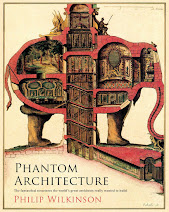Sunday, December 9, 2012
Paddy
Christmas books: 1
For the next ten days or so, the English Buildings blog becomes a book blog, as I look back at a few of the books I've enjoyed this year, potential Christmas presents, perhaps. I've chosen books relevant in some way to the main concerns of this blog – buildings, history, places – and, to begin with, a biography of one of the greatest writers about places of the last hundred years or so.
Artemis Cooper, Patrick Leigh Fermor: An Adventure
Published by John Murray
Left as an infant to grow up with strangers, expelled from various schools, cast adrift and footloose in London, walked from the Hook of Holland to Constantinople aged 18–19, slept in barns and castles, fell in love with Rumanian princess, joined Greek cavalry charge, kidnapped German general in occupied Crete, won DSO, travelled in Greece, settled in Greece with Joan Rayner, wrote award-winning travel books, lauded as best travel writer of his generation, swam the Hellespont aged 69, died aged 96 after a triumphant life lived on his own terms.
Something along those outlines represented what most of us knew of the life of Patrick Leigh Fermor (Paddy, universally) – that, and what mattered: his two stellar books on Greece, Mani and Roumeli, and his luminous account of his walk to Constantinople in A Time of Gifts and Between the Woods and the Water, the first two parts of a projected trilogy, the third part of which never appeared. The baroque prose, the breadth of learning, the delight in and knowledge of languages, the sense of place, the understanding of people: all were in a class of their own.
In Patrick Leigh Fermor: An Adventure Artemis Cooper has filled in the outline and fleshed out the life behind the works. It must have been a challenging task, given that Paddy has said so much about his life in his own books. His bejewelled prose is a tough act to follow. But she has done well, building up the details, throwing light on some of the obfuscations, and maintaining a pace that makes the book compulsively readable. Her biography gives us: a clearer account of Paddy's infant life with his surrogate parents in Northamptonshire than the brief one in A Time of Gifts, plenty of detail about his wartime service and life, a moving description of his reunion with Princess Balasha after war and the corrosive effects of communism had kept them apart for decades, quite a bit on his colourful love life, and plenty of detail about the gestation – both painstaking and painful – of his books.
I have enjoyed discovering that my hero had his faults, which were the ones, mostly, that I'd suspected – a certain thoughtlessness sometimes (amidst much true consideration for others), a know-all quality, an occasional tendency to tweak the facts about his travels (though not the essential facts: it did all happen). Oh, and a troublesome capacity to keep publishers waiting. Every fan of A Time of Gifts and Between the Woods and the Water knew about this. Where was the sequel? Years went past, and decades: still nothing. Paddy was "working on it", it was "almost ready", and so on.
Artemis Cooper deals rather briefly with the last part of Paddy's life. Even for someone as energetic as Paddy, the pace of life does slow as one reaches one's 70s, 80s, and 90s, so this brevity is forgivable and understandable – yet, was there really no more to say than some 40 pages on the last four decades of his life? However she does address the important question of the "missing" third instalment of the great walk. Briefly, back in the 1960s Paddy had drafted an account of the last part of the journey, but he remained unsatisfied with it, unable to recast it into a form that he felt good enough. His feeling that he could not live up to the quality of the first two books depressed him, and there were deep clouds over his last years. That enviable life was perhaps not so idyllic after all. Artemis Cooper has set this on the historical record, where it belongs. She also holds out hope that an edited version of Book Three of the journey will be out in about a year. She deserves our thanks for that, and for an enjoyable and generous biography.
Subscribe to:
Post Comments (Atom)









14 comments:
A few years ago in a Canadian used bookstore I saw a history of Fermor's public school. Of course, I pulled it from the shelves and opened it to the index. He was there, all right. The book mentioned him as a promising young writer (the publication date was somewhere between 1950 and 1965, I think), and made no reference to the manner of his leaving.
Are there any schools older than the King's School, Canterbury, founded in around 597? When I was at university one of my friends had been to the school and he said that our college, Corpus Christi, Oxford, founded in 1517, seemed very "new".
You can find pictures of some of the places Leigh Fermor visited in Transylvania at this site, run by a young Romanian architect (Odvos, Gurasada, Zam and Kapalnas are, I think, all included):
http://monumenteuitate.ro/ro/monuments
ZMKC: Thank you.
"I have enjoyed discovering that my hero had his faults, which were the ones, mostly, that I'd suspected – a certain thoughtlessness sometimes (amidst much true consideration for others), a know-all quality, an occasional tendency to tweak the facts about his travels (though not the essential facts: it did all happen)." Human frailties that most possess, so I think that makes him more understandable, albeit that his biographer had to point them out.
Columnist: Yes, common faults. And in his case greatly outweighed by the virtues.
Fascinating facts Philip. Did you know that in the film Ill Met by Moonlight Fermor was played by Dirk Bogarde.(I'm sure you did know).
It's funny that there was a two-part trilogy published by Fermor. Douglas Adam's Hitchhiker's Guide to the Galaxy trilogy had five parts!
Click here for Bazza’s Blog ‘To Discover Ice’
Bazza: Oh yes, I knew about Dirk Bogarde's role in Ill Met By Moonlight. Paddy had reservations about the film, as the biography makes plain, but, characteristically, these reservations had more to do with misgivings about how the movie treats the Cretans than about how it treats him.
It was the book of the week on Radio 4 recently, and thoroughly enjoyable. http://www.bbc.co.uk/programmes/b01nx5yh
There is an interesting blog devoted to him at http://patrickleighfermor.wordpress.com/
Anon: It would have made a good Book of the Week I should think - I didn't listen, having recently read the book.
The blog is good, and is worth checking out for news of future publications.
In one of the Essays Ancient and Modern Bernard Knox cited a curious demonstration of the unreliability of epic poetry: some years after the war, a folklorist asked a Cretan bard to come up with a ballad about the kidnapping of the German general. The details were wildly at variance with the facts of the operation.
George: Oh no! You'll have me doubting that business at Troy now!
This one is definitely on my xmas wish list! We wanted to feature it as a Dabbler book club choice but none of us had time to read it. Luckily the R4 adaptation was a lovely primer, it really does seem like an excellent book
Yes, Worm. Worth dropping heavy hints about this book.
Post a Comment